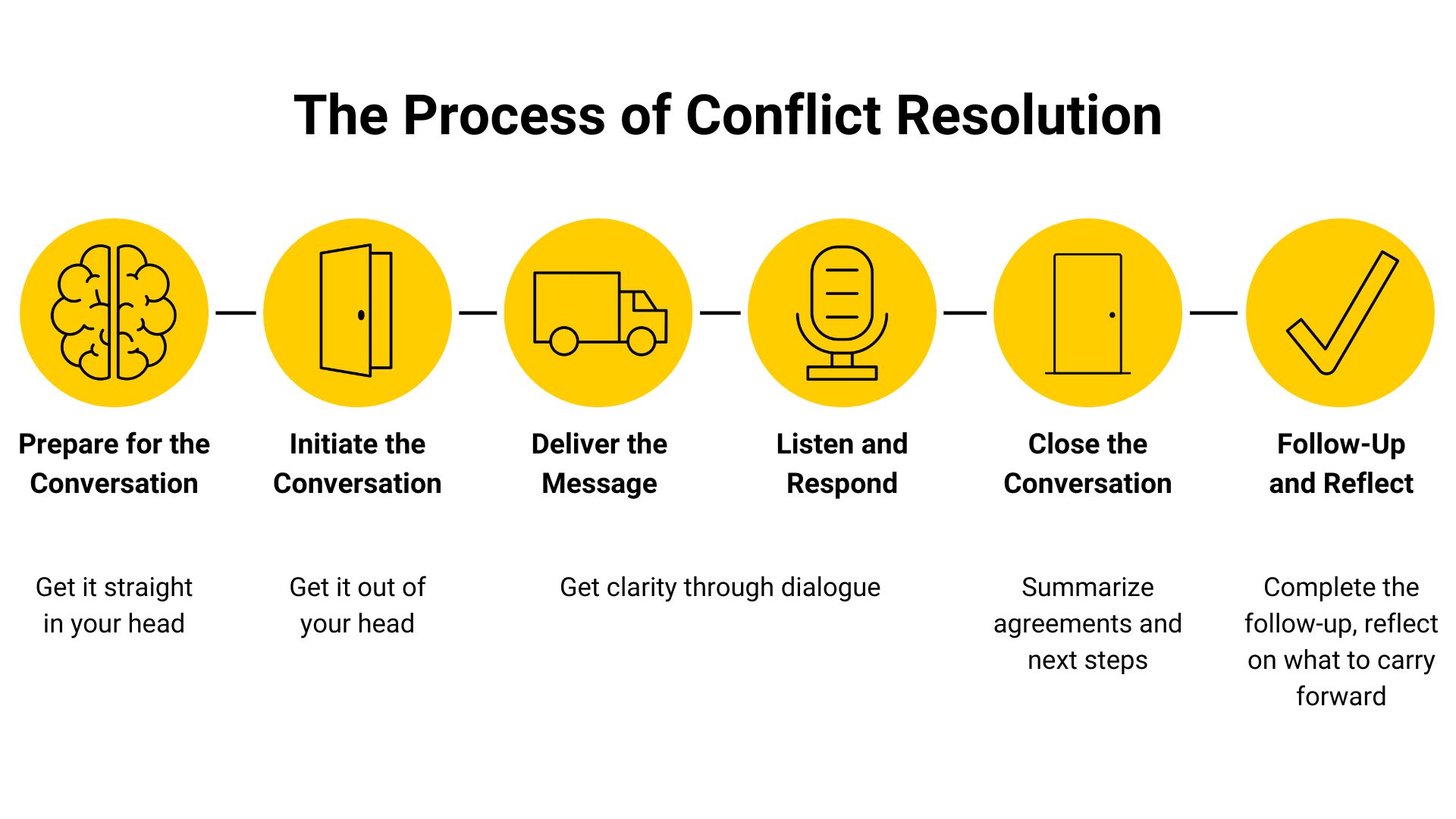Main navigation
Conflict is inevitable but resolving it doesn’t have to be overwhelming. By breaking it down into manageable steps, you can handle difficult situations with clarity and confidence. Let’s walk through the process together.
Prepare for an Upcoming Difficult Conversation
Take a few moments to reflect on and prepare for a conversation you’d like to have about a conflict you’re experiencing.

Common Workplace Conflict Examples
Scenario 1: Disagreement Over Project Direction
Two colleagues, Alex and Jordan, disagree about the best approach for an important project. Alex prefers a structured plan, while Jordan values flexibility and iterative changes. Their conflict is causing delays and frustration.
| Step | Script/Reflection Questions |
|---|---|
| Prepare for the Conversation | What is the main issue? What outcome do I want? What have I contributed to this conflict? |
| Initiate the Conversation | "I know we both care about the success of this project. Can we talk about how we can align our approaches?" "I’ve noticed we have different working styles. I’d like to find a way to blend our strengths—can we discuss?" |
| Deliver the Message | "I feel frustrated when we change the plan frequently because it makes it hard to track progress. I’d like us to find a balance between structure and flexibility." "I appreciate your adaptability, but I struggle with frequent changes. How can we make sure we’re both comfortable with our approach?" |
| Listen and Respond | "I hear that you value adaptability. Can we find a way to incorporate both our strengths?" "Can you help me understand how flexibility improves the project from your perspective?" |
| Close the Conversation | "Let's summarize what we agreed on: We will use structured phases but allow for iterative feedback at key milestones." "We’ll test this approach and check in after the first phase to make adjustments." |
| Follow-up and Reflect | Did the resolution work? Should we check in again in a few weeks? |
Scenario 2: Unequal Workload Distribution
Sam feels they are carrying more of the team's workload than their colleague Morgan. Sam is starting to feel resentful but hasn’t addressed it yet.
| Step | Script/Reflection Questions |
|---|---|
| Prepare for the Conversation | What examples show the imbalance? What solution do I hope for? |
| Initiate the Conversation | "Morgan, I wanted to check in about our workload balance. Do you have a few minutes to chat?" "I’d like to talk about how we divide our work—can we go over it together?" |
| Deliver the Message | "I feel overwhelmed when I take on extra tasks without support because it affects my ability to meet deadlines. I’d like to discuss how we can divide tasks more evenly." "I’ve noticed I’ve been handling more of the workload lately, and I want to make sure we’re both contributing fairly. Can we review how we split tasks?" |
| Listen and Respond | "I appreciate your perspective. Is there a way we can track task distribution more clearly moving forward?" "What do you think is a fair way to divide responsibilities?" |
| Close the Conversation | "Let’s touch base in a week to see if the changes are helping both of us." "If we notice an imbalance again, let’s address it sooner rather than later." |
| Follow-up and Reflect | Have responsibilities been adjusted fairly? Do I feel less overwhelmed now? |
Scenario 3: Conflict Over Communication Styles
Taylor prefers direct communication, while Casey finds Taylor’s approach too blunt. This has led to tension in team discussions.
| Step | Script/Reflection Questions |
|---|---|
| Prepare for the Conversation | How do our styles differ? What adjustments could help? |
| Initiate the Conversation | "I’d like to talk about how we communicate—do you have time to discuss?" "I feel like our communication styles sometimes clash. Can we talk about how to work together more effectively?" |
| Deliver the Message | "I feel uncomfortable when feedback is very direct because it sometimes feels personal. I’d appreciate a bit more context or cushioning." "I value clear communication, but sometimes the way feedback is delivered can feel abrupt to me. Could we find a middle ground?" |
| Listen and Respond | "I understand that you value efficiency. How can we find a middle ground that works for both of us?" "What communication approach do you feel works best, and how can we adjust to make sure we’re both comfortable?" |
| Close the Conversation | "Let’s try adjusting our approach and check in after our next project." "We can give each other feedback on how this new approach is working." |
| Follow-up and Reflect | Have we improved our communication? Do we both feel heard and respected? |
